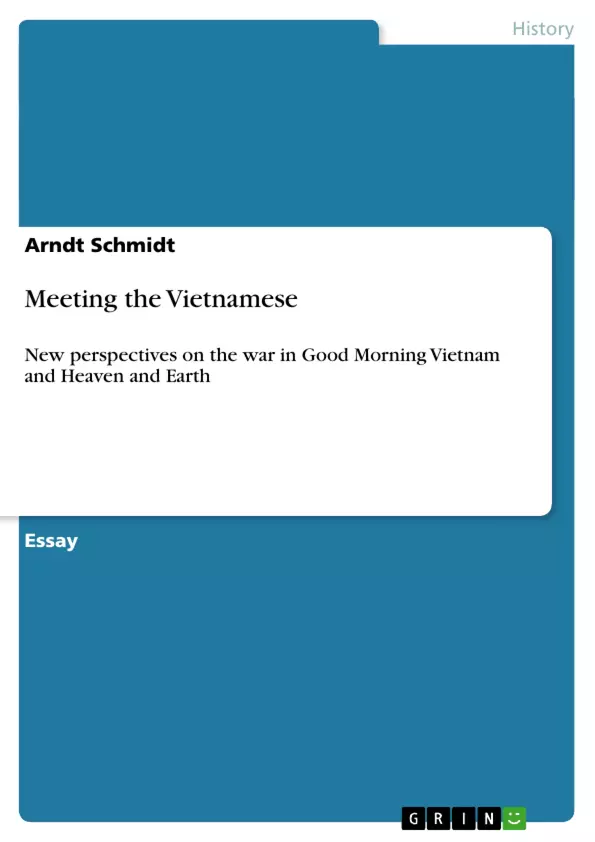The traumatic experiences of their own troops and the fact that they were fighting against a largely invisible enemy may provide a hint at why U.S. film-makers hardly yielded any space to the depiction of the Vietnamese in the first major portrayals of the Vietnam War. The expectation of a failure at the box office was probably even more decisive. The Vietnamese point of view was at first almost completely ignored. The representation of the Vietnamese was mostly reduced to the fulfilment of merely functional purposes. In films like Apocalypse Now and The Deer Hunter they are either victimized or demonized, while in Hamburger Hill they may be promoted to the role of “formidable enemies” but are otherwise left in the dark. There is no discernible effort made in these films to take a closer look at either the Vietnamese or at their country.
This changes with Barry Levinson’s Good Morning Vietnam and Oliver Stone’s Heaven and Earth. While the former is based on the experiences of an American in Vietnam, the latter builds upon two autobiographical books by a Vietnamese woman, Le Ly Hayslip. Thus, whereas in Levinson’s film Vietnamese people form an integral part for the experiences of the American protagonist, Oliver Stone constructs his entire narrative around the life and character of his Vietnamese protagonist Le Ly Hayslip.
Eventually therefore, both films convey representations of a culture that the American target audience is not familiar with. This paper strives to explore the strategies and techniques that both films employ to this end. What are their respective approaches? What assumptions do they seem to hold about Vietnam and its people? Which aspects do the films share and where do they differ? Apart from the central aspects of the country and the people inhabiting it, the topics of tradition, dignity, subversion as well as the role of atrocities will be discussed.
Inhaltsverzeichnis (Table of Contents)
- Introduction
- Synopsises
- The respective approaches of the two films
- Good Morning Vietnam
Zielsetzung und Themenschwerpunkte (Objectives and Key Themes)
This paper examines the strategies and techniques employed in "Good Morning Vietnam" and "Heaven and Earth" to portray Vietnamese culture to an American audience. It explores their respective approaches, assumptions about Vietnam and its people, shared and contrasting aspects, and focuses on themes such as tradition, dignity, subversion, and the role of atrocities.
- Cultural Representation of Vietnam
- The Impact of Genre on Narrative
- Subversion and Censorship
- The Influence of Tradition and Dignity
- Atrocities and Their Impact
Zusammenfassung der Kapitel (Chapter Summaries)
The introduction discusses the initial lack of Vietnamese representation in films about the Vietnam War and introduces "Good Morning Vietnam" and "Heaven and Earth" as significant departures from this trend. It highlights their unique perspectives and the cultural differences they explore.
The synopses section provides a concise summary of the plot for each film, focusing on the main characters and their journeys. "Good Morning Vietnam" centers on Adrian Cronauer, a radio DJ who brings unconventional humor to the American Forces Vietnam Network, while "Heaven and Earth" follows the life of Le Ly, a Vietnamese woman who experiences both the brutality of the war and the challenges of life in America.
The "respective approaches of the two films" section analyzes the distinct genres and narratives of each film. It discusses the impact of comedy in "Good Morning Vietnam" and how it allows for exploration of subversion, while "Heaven and Earth" leans more heavily on themes of tradition and dignity.
The "Good Morning Vietnam" chapter delves into the film's portrayal of the incongruence between official proceedings and the realities of everyday life for American soldiers in Vietnam. It examines the film's use of humor and satire to expose the absurdity of censorship and the disconnect between the war effort and the needs of the individuals involved.
Schlüsselwörter (Keywords)
Key terms and concepts explored in this paper include Vietnamese representation, cultural portrayal, film genre, subversion, censorship, tradition, dignity, atrocities, Vietnam War, American Forces Vietnam Network (AFVN), and historical rhetoric.
How were the Vietnamese initially portrayed in US Vietnam War films?
In early major portrayals like "Apocalypse Now" or "The Deer Hunter", the Vietnamese were often victimized, demonized, or reduced to merely functional purposes, with little effort to explore their culture.
How does "Good Morning Vietnam" differ in its representation?
While still centered on an American protagonist, the film integrates Vietnamese characters into the story and uses humor to expose the disconnect between official rhetoric and everyday reality.
What makes "Heaven and Earth" unique among Vietnam War movies?
Oliver Stone's film is based on the autobiography of a Vietnamese woman, Le Ly Hayslip, shifting the entire narrative focus to her life, character, and cultural perspective.
What themes are explored in these cultural representations?
The paper discusses strategies used to convey tradition, dignity, subversion, and the impact of atrocities on the Vietnamese people and their country.
What role did the American Forces Vietnam Network (AFVN) play in the films?
Particularly in "Good Morning Vietnam", the AFVN serves as a backdrop to explore themes of censorship and the subversion of official military proceedings through humor.



